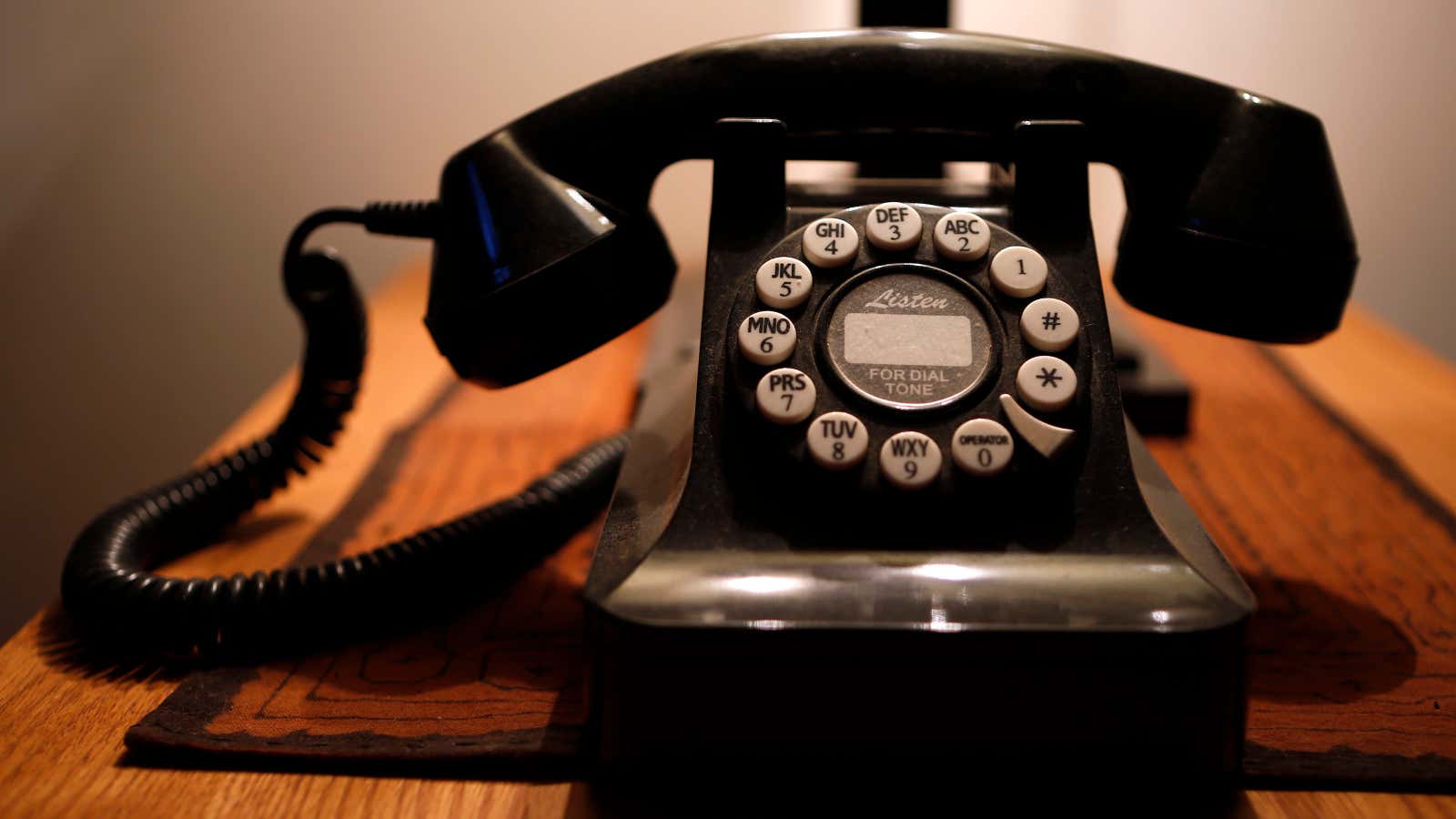Texting may be the dominant mode of communicating, but recruiters and employers haven’t caught up. Many still like to hear your voice, in an old-school phone interview, before setting up a face-to-face.
Unfortunately, that can be a problem for anyone who has forgotten how to be professional on the phone, or has never had need to be, says Carolyn Thompson, managing principal at the executive search firm Merito Group.
Bad phone etiquette is now fairly common among job applicants of all ages and of varying degrees of experience, she tells Quartz. Despite good intentions, people do things that give off a weird vibe on the phone. Then they fail to progress to the next interview stage, and wonder what happened.
Here are her tips for avoiding that fate.
Answer the call
Okay, duh. But, says Thompson, “a lot of people don’t even answer the phone anymore.”
You can’t do that when you’re expecting a call from a potential employer. It doesn’t matter how nervous you are, or how little sense you see in having a phone call when email exists, you can’t ignore the ringing and hope that a follow-up note will solve your problem.
Avoid feeling rushed, and don’t be robotic
Most phone interviews are scheduled, which gives you time to arrange your schedule and find a quiet place to talk. Nonetheless, Thompson finds that job candidates often fail to do this. They’re casual about the whole encounter because they believe phone interviews are no big deal, especially in the current, job-rich economy, so they take a call while they’re having lunch with a friend or are otherwise occupied.
“They answer in sharp spurts and come off as rude,” says Thompson. “They don’t take a screener call as seriously as they should,” she adds, but the screener “often has a lot of weight, deciding who is going to come in and who isn’t.”
When you’re talking to someone in person, says Thompson, “you answer with full sentences and you use your hands to emphasize your point.” It should be no different on the phone, she says. And yet many people are curt and robotic.
True, some screening calls are designed to be short, but interviewers will usually tell you how much time they have or explain their intentions for the call. Chances are, you can still squeeze in complete sentences. Just pay attention to the social cues, and do not go off topic, pontificate, or ramble.
Don’t whisper because you’re at work
If you haven’t found that private spot to take a call, you may be tempted to take it from work or another public setting. Don’t. The phone will ring and only then will you realize that you’re paranoid about people eavesdropping, so you’ll start whispering. You’ll keep your energy contained to avoid drawing attention to yourself.
Thompson remembers this happening with a CFO who was looking to jump to a multibillion-dollar company, one of her clients. After the interview, the high-level HR person who had spoken to the candidate on the phone said that “he didn’t think they had exhibited enough enthusiasm for the position,” says Thompson. In reality, that candidate was extremely keen on the job, but was trying to accommodate the company’s interview schedule, and ended up taking the call from a conference room and speaking sotto voce. “It’s the littlest thing in the world that can be misconstrued by someone,” says Thompson.
More generally, she suggests, keep your voice pleasant and lively. Vary your tone. Do not end every sentence on a down note. No one wants to talk to someone who sounds bored or is boring, says Thompson, who also advises smiling even though your conversation partner can’t see your expression. Science has demonstrated that they’ll “hear” it.
Avoid overly familiar language
You may not be in a conference room wearing your tailored pant suit, but picture yourself in that very scenario and adopt the appropriate language, says Thompson. In this realm, she has noted a generational difference: “There are young people who don’t talk on the phone a lot,” she says, “and they’ll say, ‘Hey, how are you?'” That’s a little too familiar for a professional context.
Take a breath before you answer a question
Take a breath when you need to think about an answer, instead of mindlessly responding with “umm,” says Thompson. As a bonus, this will prevent you from speaking over someone, which is easy to do given cell phone lag times, issues with choppy calls, and your lack of visual clues.
Let the other person ask the full question, Thompson says, pause and breathe, then answer. She adds, “Don’t do interviews on a speaker phone if you can help it, because that always causes a delay.” Make sure you have solid phone coverage, too.
Practice a smooth, courteous wrap-up
In texting’s informal culture, it’s become normal to start and stop conversations without ritualistic language, like, “Good morning” or “Talk to you soon.”
The phone demands a higher level of courtesy. Thompson suggests exiting the conversation like a socialized human, saying something like, “I really appreciate your time.” Say thank you before saying goodbye, and follow up with a thank-you note. (It’s okay to connect on LinkedIn after you’ve spoken, and to send your note through that platform, she adds.)
Bear in mind that your interviewee’s assessment of your call will be logged in company software, where it will live basically forever. One day, it may become very important to you that it reflects on you well.
Right now there are a lot of jobs around, Thompson acknowledges, but the economy can’t expand forever.
